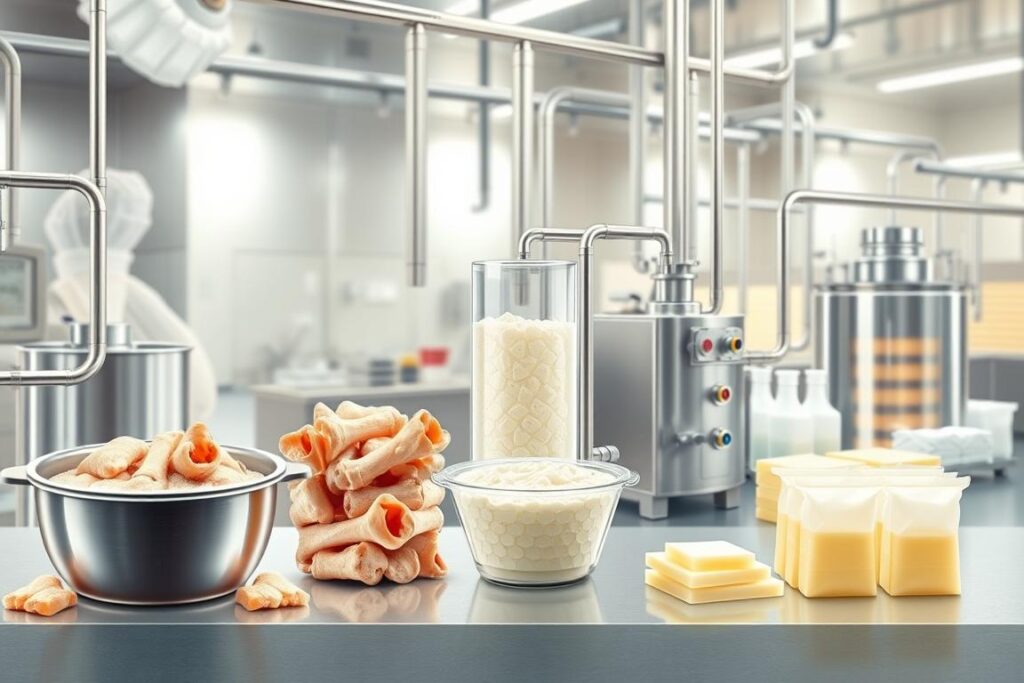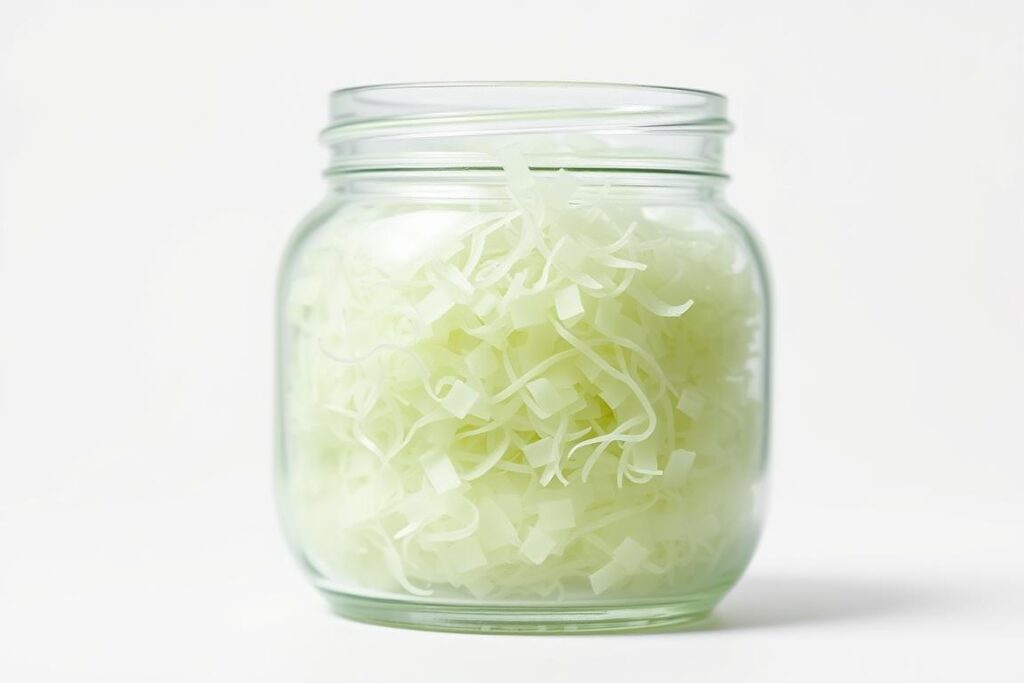Ever wanted to enjoy the soft, slurp-worthy soup dumplings but felt stuck by animal-based ingredients? The world of food is changing, and vegan soup dumplings are now a tasty option for those who follow a plant-based diet.
Traditional dumplings use collagen-rich broths and animal gelatin. But, chefs are finding plant-based options that match the taste and texture of classic soup dumplings. This lets people enjoy their favorite dishes without harming animals.
Finding a vegan substitute for gelatin was once a big challenge. Now, thanks to new cooking methods and ingredients, it’s easier to make delicious, animal-friendly dumplings.
- Vegan Soup Dumplings
- Fudgy Matcha Brownies Recipe
- Vegetarian Dinner Recipes for Chronic Kidney Disease
Key Takeaways
- Vegan soup dumplings are increasingly accessible
- Plant-based alternatives can replicate traditional gelatin textures
- Ethical dietary choices no longer mean sacrificing flavor
- Innovative cooking techniques expand culinary possibilities
- Multiple ingredient substitutes exist for creating gelatinous fillings
Understanding Gelatin and Why Vegans Avoid It
When making veggie dumplings or meatless dumplings, knowing your ingredients is key. Gelatin has been a common ingredient in many dishes. But, its origins might surprise you.

What is Gelatin Made From?
Gelatin comes from animal collagen. It’s usually made from the bones, skin, and connective tissues of cows and pigs. This ingredient is found in:
- Food products
- Pharmaceutical capsules
- Cosmetic applications
Animal Welfare Concerns
For vegans making veggie dumplings, gelatin is a big issue. The way it’s made involves animal slaughter and processing. This goes against vegan values of protecting animals.
“Every ingredient tells a story – and gelatin’s story is one of animal suffering.” – Plant-Based Chef
Religious and Dietary Restrictions
Gelatin also affects many dietary groups:
- Kosher dietary laws ban certain animal products
- Halal rules exclude specific animal ingredients
- Some religions avoid all animal byproducts
These rules have led to the creation of plant-based alternatives. This is for meatless dumplings and other dishes.
Agar Agar: The Most Popular Vegan Gelatin Alternative

Agar agar is a big win for those making vegetarian dim sum or cruelty-free dumplings. It comes from a type of seaweed found in Asia. This amazing plant-based gelatin substitute is great for binding and setting recipes.
When you dive into vegan cooking, you’ll see agar agar comes in three main types:
- Powder
- Flakes
- Bars
The powder is the easiest to use. It can replace gelatin 1:1. This makes it easy to switch to plant-based recipes for those who want cruelty-free dumplings.
| Agar Agar Form | Cost | Typical Use |
|---|---|---|
| Powder | Under $10 per packet | Direct gelatin replacement |
| Flakes | $8-$12 per package | Desserts and jellies |
| Bars | $10-$15 | Specialty cooking |
For fans of vegetarian dim sum, agar agar is a fun way to make traditional dishes without animal products. Just boil it with broth, then chill it overnight. After it sets, you can chop it and mix it into dumpling fillings, just like gelatin.
Agar agar is perfect for making gummy candies, fruit jellies, or savory dim sum. It’s a healthy, plant-based option that keeps the texture and taste just right.
Plant-Based Alternatives for Making Vegan Soup Dumplings
Making dairy-free dumplings needs new ways and plant-based stuff. Vegan cooking has changed old dumpling recipes. Now, we have tasty, plant-based versions that keep the real flavors and textures.
Traditional Dumpling Adaptations
To make vegan soup dumplings, we swap out key ingredients. Tofu dumplings are a great source of protein for these tasty plant-based dishes.
- Replace meat with firm tofu
- Use vegetable stock instead of bone broth
- Select plant-based binding agents
Best Binding Agents for Dumplings
Choosing the right binding agents is key for vegan dumplings to keep their shape and texture. Agar agar is the top choice for making soup-filled dumplings.
| Binding Agent | Effectiveness | Setting Time |
|---|---|---|
| Agar Agar | Excellent | 6-8 hours |
| Cornstarch | Good | 2-3 hours |
| Arrowroot | Moderate | 4-5 hours |
Temperature Considerations
The cooking temperature is very important for vegan soup dumplings. Steaming at the right heat for 8-9 minutes keeps them moist and delicious.
- Steam at medium heat
- Target internal temperature of 165°F
- Allow proper cooling before serving
Your homemade dairy-free dumplings will wow everyone with their real taste and creative plant-based twist.
Carrageenan and Irish Moss as Gelatin Substitutes
Carrageenan is a powerful plant-based gelling agent. It’s great for vegan cooking, making dishes like seitan dumplings rich in texture. It comes from red seaweed and is a natural alternative to animal-based gelatin.
For making buddha’s delight dumplings, carrageenan is a big help. It gives the right consistency without using animal products. It works well in both hot and cold dishes.
- Derived from red seaweed varieties
- Excellent gelling and thickening properties
- Compatible with various cooking techniques
- Suitable for vegan and vegetarian diets
Irish moss is another seaweed-based option. It gives a smooth, gel-like texture to seitan dumplings. It’s great for chefs who want to avoid animal products.
Start with small amounts and try different recipes. Each product has its own special qualities. Practice and patience will help you master these plant-based gelling agents.
Pro tip: Always source high-quality, food-grade carrageenan or Irish moss from reputable suppliers to ensure the best results in your vegan cooking adventures.
Natural Thickeners: Cornstarch, Pectin, and Arrowroot
When making vegan soup dumplings, picking the right thickener is key. You need natural thickeners that work like gelatin but are plant-based.
Proper Usage Ratios
Knowing the right amounts is important for plant-based dumplings. Here are some tips for natural thickeners:
- Cornstarch: Use 1 tablespoon per cup of liquid for medium thickness
- Arrowroot: Substitute at a 1:1 ratio with other starches
- Pectin: Best for specific applications like jellies and custards
Best Applications for Each Thickener
Each thickener is better for different vegan soup dumplings:
- Cornstarch: Ideal for clear soups and sauces with 25-30% amylose content
- Arrowroot: Excellent for delicate fillings with 20% amylose content
- Pectin: Limited use in dumpling preparation
Temperature Sensitivity
Temperature is very important for thickening vegan soup dumplings. Cornstarch and arrowroot react differently to heat, affecting your dish’s texture.
When making plant-based dumplings, remember each thickener is unique. Try small batches to get the texture right for your recipe.
Commercial Vegan Gelling Products
Finding the right gelling agent is key to making veggie dumplings stand out. Commercial vegan gelling products have changed plant-based cooking. They offer easy alternatives to traditional gelatin.
Top brands in the market provide great solutions for home cooks. They help make meatless dumplings perfect:
- Vegan Jel by Natural Desserts
- Agar Powder from Now Foods
- Carrageenan-based gelling mixes
- Pectin-based binding agents
These commercial products have many benefits for veggie dumplings:
- Quick and easy preparation
- Consistent binding properties
- Plant-based ingredients
- No animal welfare concerns
Pro tip: Always check the ingredient list when picking a vegan gelling product. Some might have small differences that affect your dumplings’ texture and taste.
“The right gelling agent can make or break your plant-based dumpling recipe.” – Vegan Culinary Institute
Try out different commercial vegan gelling products to find the best one for your veggie dumplings. Each product adds its own special touch to your cooking.
Tips for Successfully Using Vegan Gelatin Alternatives
Creating vegetarian dim sum needs patience and practice. It’s all about mastering plant-based gelling agents. Making cruelty-free dumplings requires careful choice of ingredients and preparation methods.
Common Mistakes to Avoid
When trying vegan gelatin alternatives, you might run into some common problems:
- Incorrect hydration of plant-based thickeners
- Overheating sensitive ingredients
- Neglecting temperature control
- Improper liquid-to-gelling agent ratios
Troubleshooting Key Challenges
Here are some tips to overcome common issues and make perfect vegetarian dim sum:
| Problem | Solution |
|---|---|
| Insufficient Setting | Adjust ingredient quantities and chilling time |
| Unwanted Texture | Experiment with different plant-based alternatives |
| Flavor Interference | Use neutral-tasting gelling agents |
Success with cruelty-free dumplings comes from knowing each ingredient’s role. Patience and experimentation are key to mastering these culinary techniques.
Health Benefits of Plant-Based Gelling Agents
Plant-based gelling agents in dairy-free dumplings bring big health wins. They change old recipes into new, healthy ones. Tofu dumplings are a great example of how these agents boost meal nutrition.
Here are some key health benefits of plant-based gelling agents:
- They have more fiber than animal gelatin
- They’re packed with minerals like calcium, iron, and magnesium
- They’re low in calories
- They might help boost your immune system
Plant-based ingredients are full of protein, making meals more nutritious. Let’s look at some protein comparisons:
| Ingredient | Protein per 100g |
|---|---|
| Tofu | 8g |
| Mushrooms | 3g |
| Textured Vegetable Protein | 50g |
Choosing plant-based gelling agents can really change what you eat. Vegan soup dumplings made with these have 35-50 calories per serving. That’s less than 80+ calories in meat-based ones.
Using ingredients like mushrooms, tofu, and fermented sauces can help your digestion. They also add important nutrients. These choices help you eat well without losing flavor or texture.
Conclusion
Exploring vegan alternatives opens up a world of tasty possibilities. You can enjoy dishes like seitan dumplings and buddha’s delight dumplings. These options are not only delicious but also healthier than traditional recipes.
Plant-based cooking is more than just making vegan versions of old favorites. It’s about learning new ways to cook. For example, vegan soup dumplings can be made with tofu and mushrooms. This adds protein and flavor while helping you eat healthier.
Your kitchen can be a place of endless creativity. Whether you’re making buddha’s delight dumplings or seitan dumplings, you’re choosing sustainable and nutritious meals. The future of food is all about plants, making our meals better for us and the planet.
Every recipe you try is a chance to learn and improve. As you explore plant-based cooking, your skills will grow. You’ll create meals that are not only tasty but also good for you and the planet.
